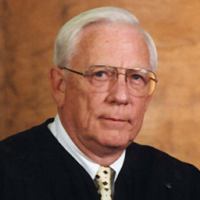Only in Alabama do Judges Overrule a Jury and Impose Death Penalty
 Judge Ferrill McRae
Judge Ferrill McRae
Two members of the U.S. Supreme Court have called for a review of Alabama’s judicial system, which allows judges to overrule juries and sentence convicted criminals to death.
Justice Sonia Sotomayor said this week that “electoral pressures” may have compromised the decision-making of some Alabama judges, who are elected to office on partisan ballots.
Justice Stephen G. Breyer joined Sotomayor in dissenting (pdf) from the court’s decision not to hear an appeal by Mario Dion Woodward, a death-row inmate who killed an Alabama police officer. In order for the case to have been heard, Sotomayor needed two other justices to support her position, but the court’s other liberals, Justices Ruth Bader Ginsburg and Elena Kagan, declined.
Three states—Alabama, Florida and Delaware—permit judges to override jury recommendations that a killer receive life in prison. But only judges in Alabama are using the power, according to Sotomayor.
“Since 2000…there have been only 27 life-to-death overrides, 26 of which were by Alabama judges,” pointed out Sotomayor.
Since 1982, 95 defendants were sentenced to death by Alabama judges in spite of juries’ recommendations for lenient sentences, according to Sotomayor. In 12 of those cases, the jury’s vote for a life term, rather than a death sentence, was unanimous. Forty-three of the 95 convicted felons are currently on death row.
The Supreme Court approved Alabama’s death-penalty procedure 18 years ago, leading Sotomayor to now write: “In my view, the time has come for us to reconsider that decision.”
“There is no evidence that criminal activity is more heinous in Alabama than in other states, or that Alabama juries are particularly lenient in weighing aggravating and mitigating circumstances,” the justice wrote.
“The only answer that is supported by empirical evidence is one that, in my view, casts a cloud of illegitimacy over the criminal justice system: Alabama judges, who are elected in partisan proceedings, appear to have succumbed to electoral pressures,” Sotomayor added.
Sotomayor’s dissenting opinion cites a 2011 report (pdf) that describes an Alabama judge, the late Mobile Circuit Judge Ferrill McRae, who has, six times, overridden jury verdicts in order to impose the death penalty. His election campaigns, notes the report, highlighted his support of capital punishment.
Sotomayor also mentioned some of the strange justifications cited by Alabama judges in overriding jury verdicts. In one case, the judge noted that a defendant who had an IQ of 65 “intentionally test[ed] low on standard IQ tests.” In another case, a judge up for reelection when he sentenced a 19-year-old defendant said, “If I had not imposed the death sentence, I would have sentenced three black people to death and no white people.”
-Noel Brinkerhoff, Danny Biederman
To Learn More:
Sotomayor Questions Alabama Death-Penalty Process (by Robert Barnes, Washington Post)
Alabama Death Penalty Orders Raise Eyebrows (by Barbara Leonard, Courthouse News Service)
The Death Penalty in Alabama: Judge Override (Equal Justice Initiative) (pdf)
African-Americans Still Excluded from Southern Juries (by Noel Brinkerhoff and David Wallechinsky, AllGov)
- Top Stories
- Unusual News
- Where is the Money Going?
- Controversies
- U.S. and the World
- Appointments and Resignations
- Latest News
- Musk and Trump Fire Members of Congress
- Trump Calls for Violent Street Demonstrations Against Himself
- Trump Changes Name of Republican Party
- The 2024 Election By the Numbers
- Bashar al-Assad—The Fall of a Rabid AntiSemite






Comments